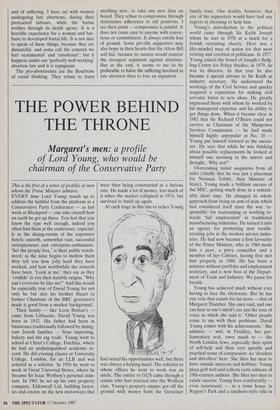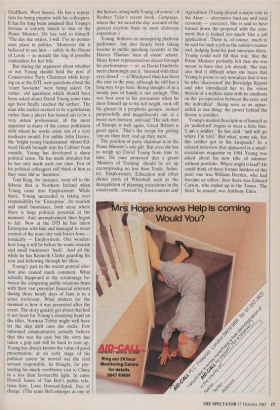THE POWER BEHIND THE THRONE
Margaret's men: a profile
of Lord Young, who would be chairman of the Conservative Party
This is the first of a series of profiles of men whom the Prime Minister admires.
EVERY time Lord Young stands up to address the faithful from the platform at a Conservative Party Conference — as last week at Blackpool — one asks oneself how on earth he got up there. You feel that you know the type well enough, indeed you often find them at the conference, especial- ly in the dining-rooms of the expensive hotels: smooth, somewhat vain, successful entrepreneurs and enterprise-enthusiasts. 'Set the people free,' is their public watch- word; as the wine begins to mellow them they tell you how jolly hard they have worked, and how worthwhile the rewards have been. 'Look at me,' they say as they 'confide' in you their humble origins. 'Why can't everyone be like me?' And this would be especially true of David Young for not only he but also his brother Stuart (a former Chairman of the BBC governors) made it good from a modest background.
Their family — like Leon Brittan's — came from Lithuania. David Young was born in 1932. His father had been in businesses traditionally followed by immig- rant Jewish families — flour importing, bakery and the rag trade. Young went to school at Christ's College, Finchley, where he had an undistinguished academic re- cord. He did evening classes at University College, London, for an LLB and was articled as a solicitor. In 1956 he went to work at Great Universal Stores, where he became Sir Isaac Wolfson's personal assis- tant. In 1961 he set up his own property company, Eldonwall Ltd, building factor- ies and estates on the new motorways that were then being constructed at a furious rate. He made a lot of money, lost much of it when the market collapsed in 1974, but survived to build up again.
At each stage in this rise to riches Young - had seized his opportunities well, but there was always a helping hand. The solicitor to whose offices he went to work was an uncle. The entrée to GUS came through a cousin who had married into the Wolfson clan. Young's property empire got off the ground with money from the Gestetner family trust. One doubts, however, that any of his supporters would have had any regrets in choosing to help him.
Young's introduction to the political world came through Sir Keith Joseph whom he met in 1976 at a lunch for a Jewish retraining charity. Here was a like-minded man of action for that most retiring and cerebral of politicans. In 1977, Young joined the board of Joseph's fledg- ling Centre for Policy Studies; in 1979, he was its director. In that year he also became a special adviser to Sir Keith as industry secretary. He understood the workings of the Civil Service and quickly acquired a reputation for making civil servants listen to new ideas. He greatly impressed those with whom he worked by his managerial expertise and his ability to get things done. When it became clear in 1982 that Sir Richard O'Brien could not survive as Chairman of the Manpower Services Commission — he had made himself highly unpopular at No. 10 — Young put himself forward as the succes- sor. He says that while he was thinking about possible replacements he looked at himself one morning in the mirror and thought, 'Why not?'
Overcoming initial suspicions from all sides (chiefly that he was just a placeman for Norman Tebbit, then Minister of State), Young made a brilliant success of the MSC, getting much done in a remark- ably short time. He changed its whole approach from being an arm of state which had considered itself since the war 're- sponsible' for maintaining or working to- wards 'full employment' in traditional manufacturing industries. He turned it into an agency for promoting new wealth- creating jobs in the modern service indus- tries. He had now become a firm favourite of the Prime Minister, who in 1984 made him a peer, a privy councillor and a member of her Cabinet, having first met him properly in 1980. He has been a minister without portfolio and employment secretary, and is now boss at the Depart- ment of Trade and Industry. We pause for breath.
Young has achieved much without ever having to face the electorate. But he has one vote that counts for far more — that of Margaret Thatcher. She once said, and one can hear in one's mind's ear just the tone of voice in which she said it: 'Other people come to me with their problems. David Young comes with his achievements.' She admires — and, in Finchley, her par- liamentary seat, owes much to — the North London Jews, especially their spirit of self-help and their very specific and practical sense of compassion: no `droolers and drivellers' here. She likes her men to have outside interests and hobbies: Young plays golf well and collects early editions of 19th-century authors. She likes her men to exude success: Young lives comfortably — even luxuriously — in a town house in Regent's Park and a ranchero-style villa in Graffham, West Sussex. He has a reputa- tion for being popular with his colleagues. It has for long been assumed that Young's fortune is entirely linked to that of the Prime Minister. He has said so himself: 'The day she retires, I will. I've no perma- nent place in politics.' Moreover she is believed to see him — safely in the House of Lords — as outside the ring of possible contenders for her title.
But during the argument about whether or not Young should hold the post of Conservative Party Chairman while keep- ing on at the DTI, new questions about the 'court favourite' were being asked. Or rather, old questions which should have been asked about David Young some time ago have finally reached the surface. The man who earlier seemed to be a gentleman rather than a player has turned out to be a very astute professional, all the more apparent as many of the career politicians with whom he works come out of a very mediocre mould. For unlike John Davies, the 'bright young businessman' whom Ed- ward Heath brought into his Cabinet from outside, Young has developed a sharp political sense. He has made mistakes but he has only made each one once. Few of his political colleagues still think of him as they once did as 'harmless'.
Torn King, for instance, went off to the Siberia that is Northern Ireland when Young came into Employment. While there, Young succeeded in taking over responsibility for 'Enterprise', for tourism and small businesses, both areas where there is huge political potential at the moment. And unemployment then began to fall. Now at the DTI he has taken Enterprise with him and managed to wrest control of the inner city task forces from — ironically — Employment. One wonders how long it will be before he wants tourism and small businesses 'back'. And all the while he has Kenneth Clarke guarding his rear and following through his ideas.
Young's part in the recent general elec- tion also caused much comment. What actually happened in the scrummage be- tween the competing public relations firms with their vast potential financial interests during those heady days of June is in a sense irrelevant. What matters for the moment is how it was presented after the event. The story quickly got about that had it not been for Young's steadying hand on the tiller, Norman Tebbit might well have let the ship drift onto the rocks. Few informed commentators actually believe that this was the case but the story has taken a grip and will be hard to root up. Young has always known the value of good presentation: at an early stage of his political career he moved out the civil servant responsible, he thought, for pre- senting his much overblown visit to China in a less than favourable light. In came Howell James of Tim Bell's public rela- tions firm, Lowe Howard-Spink, free of charge. (The same Bell emerges as one of
the heroes, along with Young, of course, of Rodney Tyler's recent book, Campaign, where the 'we saved the day' account of the general election finds its most elaborate exposition.)
Young, hitherto an uninspiring platform performer, has also clearly been taking lessons in public speaking recently at the Harvey Thomas 'men of vision' school. Many fewer representatives dozed through his performance — or, as David Dimbleby more charmingly put it, 'listened with their eyes closed' — at Blackpool than has been the case in the past, although he still has a long way to go here. Being thought of as a steady pair of hands is not enough. This was best seen in his peroration when he drew himself up to his full height, took off his glasses in a prophetic gesture, looked purposefully and magnificently out at a brave new horizon, and said 'The sick man of Europe is well again, Great Britain is great again.' That's the recipe for getting 'em on their feet; and up they went.
The position of party chairman is in the Prime Minister's sole gift. But even she has to weigh up David Young from time to time. He once proposed that a grand 'Ministry of Training' should be set up encompassing no less than Trade, Indus- try, Employment, Education and other choice parts of Whitehall such as the deregulation of planning restrictions in the countryside, covered by Environment and Agriculture (Young played a major role in the Alure — alternative land use and rural economy — exercise). She is said to have turned down the proposal with the com- ment that it looked too much 'like a job application'. There is, of course, much to be said for such a job as the nation's trainer and, judging from his past successes there, Young could well fill that role. But the Prime Minister probably felt that she was meant to have that job already. She may also find it difficult when she hears that Young is prone to say nowadays that it was he who 'discovered' the Beveridge Report and who introduced her to the vision therein of a welfare state with its emphasis on the 'co-operation between the state and the individual'. Being seen as an appar- atchik is one thing: the power behind the throne is another.
Young's modest description of himself as an `underlord' begins to wear a little thin. 'I am a soldier,' he has said, 'and will go where I'm told.' But what, some ask, has this soldier got in his knapsack? In a relaxed interview that appeared in a small- circulation magazine in 1984 Young was asked about his new title of minister without portfolio. Where might it lead? He could think of three former holders of this post: one was William Deedes, who had become an editor; then there was Edward Carson, who ended up in the Tower. The third, he mused, was Anthony Eden.



























































 Previous page
Previous page